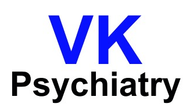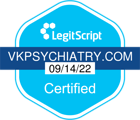Psychiatric Services
Mental health includes our emotional, psychological, and social well-being. It affects how we think,
feel, and act. It also helps determine how we handle stress, relate to others, and make choices.
Mental health is important at every stage of life, from childhood and adolescence
through adulthood and our golden years.
Over the course of your life, if you experience mental health problems your thinking, mood, and
behavior could be affected. Many factors contribute to mental health problems, including:
- Biological factors, such as genes or brain chemistry
- Family history of mental health problems
- Life experiences, such as trauma or abuse
- Current life circumstances such as chronic medical conditions, uncertainty, strained relationships, and demanding work expectations.
Mental health problems are common but help is available.
Warning Signs
Not sure if you or someone you know is living with mental health problems? Experiencing one or more
of the following feelings or behaviors can be an warning sign of a problem:
Freedom from Anxiety is Possible
Anxiety is an unpleasant emotional state.
It is described as a subjective experience of fear, physical symptoms, bodily discomfort, or impending threat or death.
Anxiety is a normal reaction to stress.
But it becomes pathological when it occurs without a trigger, is constant, or interferes with one’s daily functioning.
An estimated 19.1% of U.S. adults had any anxiety disorder in the past year.
An estimated 31.1% of U.S. adults experience any anxiety disorder at some time in their lives.
Hope for Depression
Depression is an emotional condition consisting of a pervasive low mood, negative thinking patterns, and reduced level of enjoyment.
An estimated 19.4 million adults in the United States had at least one major depressive episode.
ADHD
Attention Deficit Hyperactivity Disorder
ADHD is a developmental condition that can make concentration difficult and interfere with learning.
The overall prevalence of adults with ADHD is about 4.4%
Alcohol & Substance Abuse
Over 164 Million Americans were treated for substance abuse within the last year.
Dependence can involve both physical and/or psychological components. Physical dependance is best understood in terms of withdrawal and tolerance. Physical withdrawal is when negative feelings are experienced when the substance is not taken. Tolerance is when an individual needs to take a substance at greater quantities to feel the same effect.
Psychological dependence involves a sense of compulsion to take the substance, difficultly controlling the amount of substance used, increased amount of time spent thinking about the substance, obtaining, taking, and recovering from the substance, persistent but futile wish to cut down use, and continued use despite negative consequences.
When a person is abusing a substance, it often leads to significant impairment or distress. They may fail to fulfill obligations at school, work, or home.
They may engage in risky and hazardous behavior.
Or they may develop legal problems.
Bi Polar Disorder
Bipolar is an emotional condition characterized by recurrent episodes of alternating high and low moods.
A person with this condition will experience episodes of depression: pervasive low mood, negative thinking patterns, and reduced level of enjoyment, but will also experience periods of feeling elated, expansive, and/or irritable.
Depending on the severity of the condition, psychoses may also be present.
An estimated 5% of U.S. adults are diagnosed with bipolar disorder
Obsessive Compulsive Disorder or OCD
Obsessions are persistent, unwanted, recurrent ideas, thoughts, impulses, or images. They are intrusive, often senseless, and uncomfortable.
Compulsions are repetitive, purposeful behaviors. They are performed with reluctance in response to an obsession.
They are often performed in a certain stereotyped manner and are designed to prevent discomfort. The person often realizes the act is unreasonable.
Lifetime prevalence of OCD among U.S. adults is 2%-3%
Insomnia
Insomnia is when an individual does not able to get enough sleep.
The person may have trouble falling asleep, staying asleep, and/or wake up early.
Each year nearly 60 million Americans suffer from insomnia.
Eating Disorders
Everyone needs to eat to live.
But it becomes problematic when a person becomes preoccupied with food or dieting.
Some individuals may also start using food as a coping mechanism and engaging in binge eating.
The lifetime prevalence of eating disorders is at least 3%.
Schizophrenia
Contrary to popular belief, Schizophrenia is not multiple personalities.
It is an organic brain condition that causes the individual to experience psychoses such as hallucinations and delusions.
The person will also experience loss of motivation, loss of interest or enjoyment in daily activities, withdrawal from social life, have difficulty showing emotions, have difficulty functioning normally, and have problems with attention, concentration, and memory.
The prevalence of schizophrenia is less than 1%
Post Traumatic Stress Disorder
Everyone experiences trauma and loss.
But, Post-traumatic stress disorder (PTSD) can develop after a person is exposed to an intense life-threatening traumatic event.
The lifetime prevalence of PTSD is 6.8%. Fortunately, PTSD does not have to be permanent and can be treated.
Suicide and Self Harm
Suicide is intentional self-inflicted death. Deliberate self-harm is all intentionally inflicted harm that does not result in death.
According to the (CDC) Leading Causes of Death Reports, in 2019:
Suicide was the tenth leading cause of death in the United States, claiming the lives of over 47,500 people.
According to DMH.MO.GOV:
Missouri is ranked 13th highest in the nation with a suicide rate of 18.27 in 2016 (per 100,000). The national rate is 13.42.
- Over 1,000 Missourians died by suicide in 2016.*
- On average, 1 person dies by suicide every 7 hours in Missouri.
When to Seek Help
- If the situation is potentially life-threatening, get immediate emergency assistance by calling 911, available 24 hours a day.
- If you are in crisis, call the National Suicide Prevention Lifeline at 988, or text the Crisis Text Line
(text HELLO to 741741.)
- If you are a veteran in crisis, call the Veterans Crisis Hotline at 988 then press 1, or send a message to the text line at 838255..
Stress & Grief
Most significant stresses involve threat or loss.
In reaction to a stressor a person will experience an emotional response, a physical response, and a psychological response.
A person will typically recover when the stressor is removed.
But, if a stressor was particularly intense or long lasting, the body’s response can become overwhelmed or maladaptive.
If you are struggling, there is always hope for a better tomorrow.
Popular Questions
Got a question? We’re here to help.

